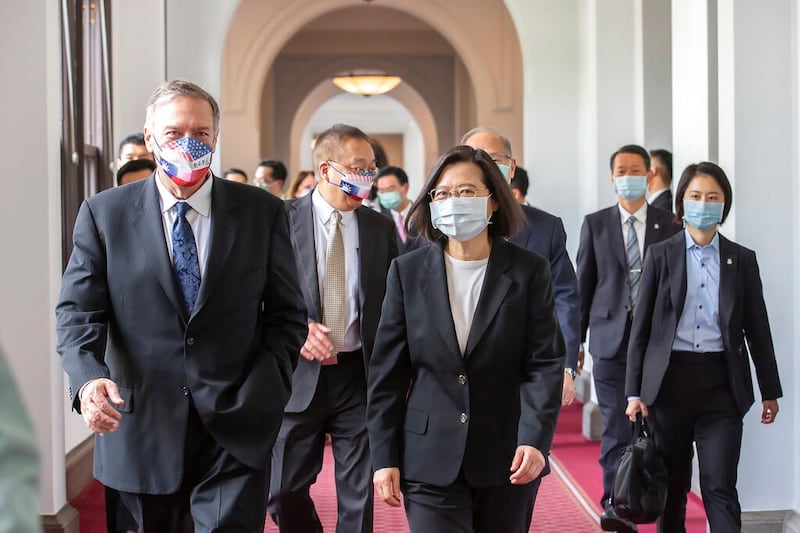Leaders of the four member states of the Quadrilateral Security Dialogue, or Quad, said after a snap meeting that a major conflict like in Ukraine should not be allowed to happen in the Indo-Pacific.
The leaders of the United States, Australia, India and Japan met virtually late on Thursday to discuss the Russia-Ukraine war and its possible impact.
The Japanese Prime Minister, Fumio Kishida, said after the meeting that "unilateral changes to the status quo by force or coercion like the recent Russian aggression against Ukraine are also unacceptable in the Indo-Pacific region."
In his statement, Australian Prime Minister Scott Morrison said: "We cannot allow what is happening in Ukraine now to ever happen in the Indo-Pacific."
“We are resolute in our commitment to a free and open Indo-Pacific region where smaller states do not need to live in fear of more powerful ones.”
A joint readout of the Quad leaders call said the meeting was "to reaffirm their commitment to a free and open Indo-Pacific, in which the sovereignty and territorial integrity of all states is respected and countries are free from military, economic, and political coercion."
It also said the leaders “agreed to stand up a new humanitarian assistance and disaster relief mechanism which will enable the Quad to meet future humanitarian challenges in the Indo-Pacific,” as well as to respond to the crisis in Ukraine.
The four leaders will meet in person "in Tokyo in the coming months," the readout said. Japanese sources say it may be in May.

Persuading India
The summit was convened at U.S. President Joe Biden’s request, reportedly after India abstained on a U.N. resolution condemning Russia’s aggression in Ukraine.
The resolution was adopted on Wednesday at a rare emergency session of the U.N. General Assembly with 141 of the U.N.’s 193 members voting in its favor. India was among 35 countries that abstained, together with China and South Africa. India has a strong, long-standing relationship with Russia, especially in the defense sector.
Washington had been making efforts to persuade Delhi to take a clear stance in opposing Russia's aggression in Ukraine, Donald Lu, U.S. assistant secretary of state for South and Central Asia, told a Senate subcommittee hearing on Wednesday.
In response, Indian Prime Minister Narendra Modi said after the Quad summit that the leaders "reaffirmed our shared commitment to ensuring security, safety and prosperity in the Indo-Pacific."
Modi "underlined that the Quad must remain focused on its core objective of promoting peace, stability and prosperity in the Indo-Pacific region," according to his office.
The Indian prime minister also emphasized the "need to return to a path of dialogue and diplomacy" in relation to developments in Ukraine.
Taiwan issue
As the war is ravaging Eastern Europe, there are concerns that China would feel emboldened to make a move on Taiwan which it considers a breakaway province and repeatedly vows to reunite with the mainland.
Experts say Beijing is watching the Ukrainian developments closely before making any decision in regards to Taiwan.
On Friday, when asked about a possibility that China would use force against the self-governing island amid the Ukrainian war, former U.S. secretary of state, Mike Pompeo, said: “I don’t think we know how [Chinese leader] Xi jinping will interpret what’s taking place in Ukraine today.”
Pompeo, on his first ever visit to Taiwan, warned that "losing Taiwan would directly imperil our vital national interest in the United States.”
The former top U.S. diplomat said that the U.S. should change its 50-year strategic ambiguity on Taiwan and “immediately take necessary and long overdue steps to do the right and obvious thing which is to offer the Republic of China (Taiwan) America's diplomatic recognition as a free and sovereign country."
The call was met with angry response from Beijing. China Foreign Ministry spokesperson Wang Wenbin on Friday said: "Mike Pompeo is a former politician with bankrupt credibility, and his nonsense is doomed to failure.”
On Thursday, Wang called Pompeo’s meeting with the Taiwanese leader Tsai Ing-wen a “simply shameless and futile” act.
Pompeo served as secretary of state during the Trump administration.

